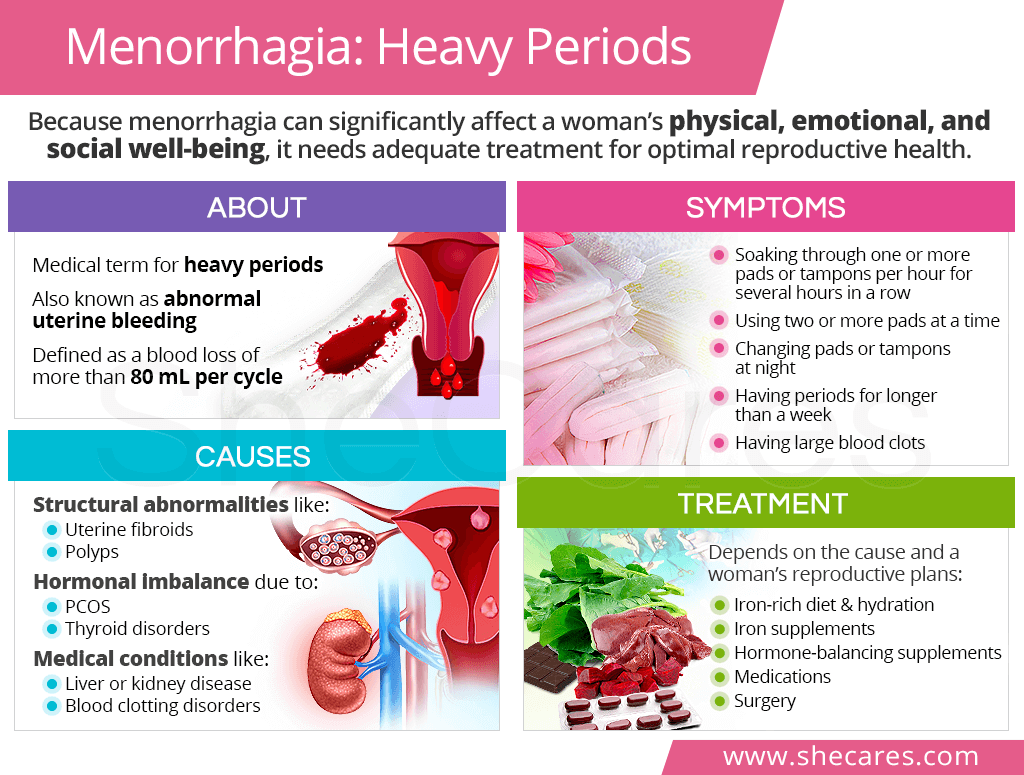What is Menorrhagia?
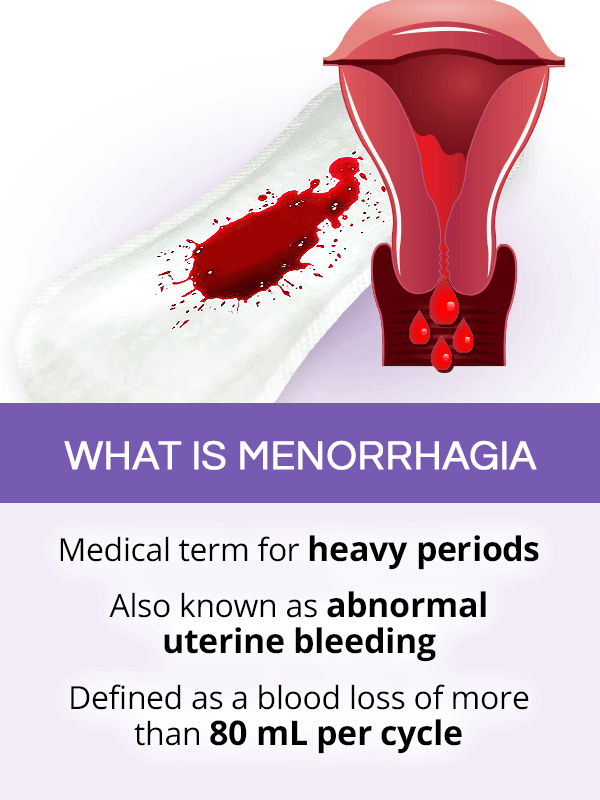
Menorrhagia is a medical term for heavy period flow or excessively long periods.
It is also referred to as abnormal uterine bleeding, and it is classified as a menstrual disorder.
For reference, a woman with healthy periods loses about 40-60 mL of blood per period, while one with menorrhagia might lose more than 80 mL of blood per cycle.1,2
Menorrhagia Symptoms
There are several characteristic menorrhagia symptoms reported by women who suffer from it, including:3
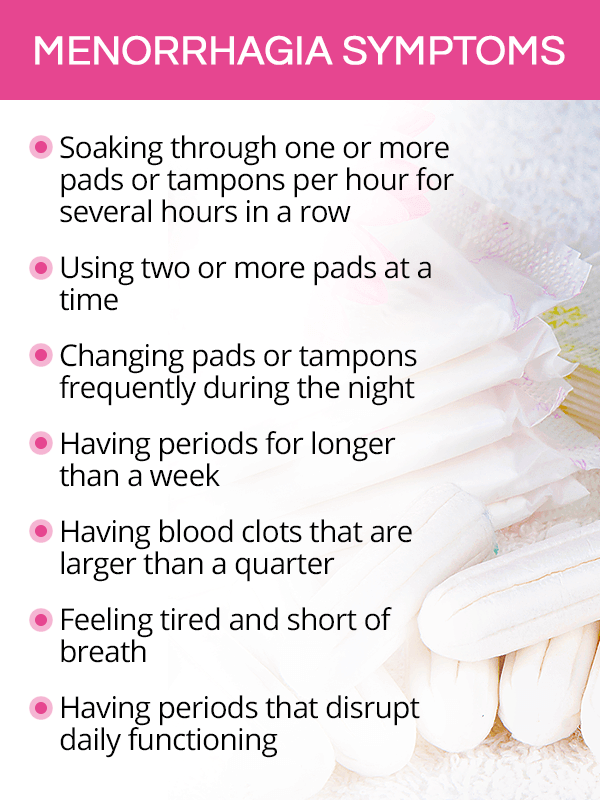
- Soaking through one or more pads or tampons per hour for several hours in a row
- Using two or more pads at a time
- Changing pads or tampons frequently during the night
- Having periods for longer than a week
- Having blood clots that are larger than a quarter
- Feeling tired and short of breath
- Having periods that disrupt daily functioning
Heavy Period Causes
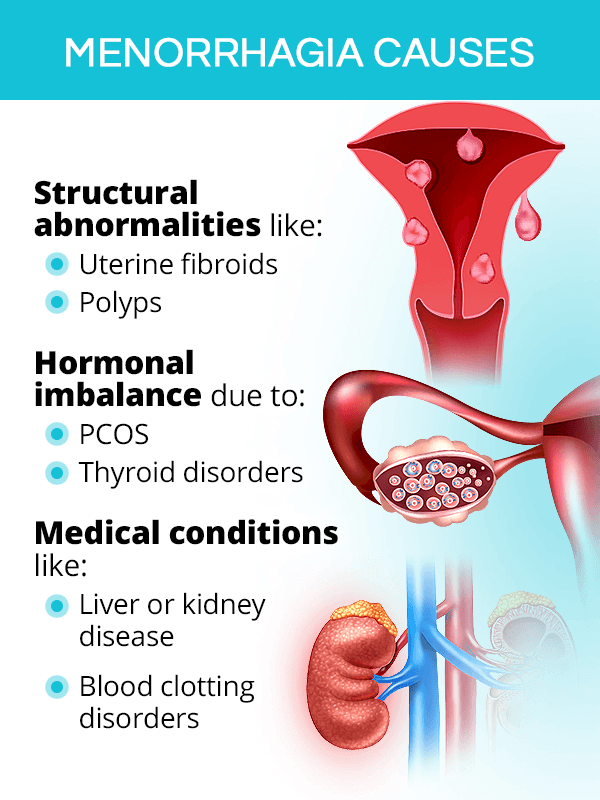
While some menorrhagia causes are not known, the majority can be attributed to one of the following:
Structural Abnormalities
Various, usually noncancerous, growths within the reproductive tract, like uterine fibroids or polyps, are the most common cause of heavy periods. They deregulate normal uterine contractions that occur in order to shed the endometrial lining during a period, often prolonging or intensifying the bleeding.
Hormonal Imbalance
Hormonal imbalance is another probable cause of menorrhagia as it leads to an overdevelopment of the endometrium, which will result in heavy period flow. It may due to polycystic ovary syndrome (PCOS), thyroid disorders, endometriosis, obesity, or insulin resistance, among others.
Medical Conditions
Although rare, certain medical conditions - such as kidney disease, liver disease, genetic disorders, blood clotting disorders, cancers, or pelvic inflammatory disease, (PID) - or medication side effects can also be potentially what causes heavy periods.
Complications of Menorrhagia
Menorrhagia can take a toll on a woman's physical and emotional well-being, including the following effects:
Anemia
Because heavy periods cause significant blood loss, they can result in iron deficiency anemia. In fact, two out of three women with heavy periods suffer from anemia, which can cause symptoms like fatigue, paleness, and infertility.2
Severe Cramps
While not all women with menorrhagia experience cramping pain during their periods, those who do are often in so much pain that they require medical intervention or strong prescription medications.
Psychosocial Effects
Some women have more difficulty coping with heavy menstrual bleeding than others, resulting in feelings of embarrassment, fear of being in public, and avoidance of social outings.
Menorrhagia Treatment
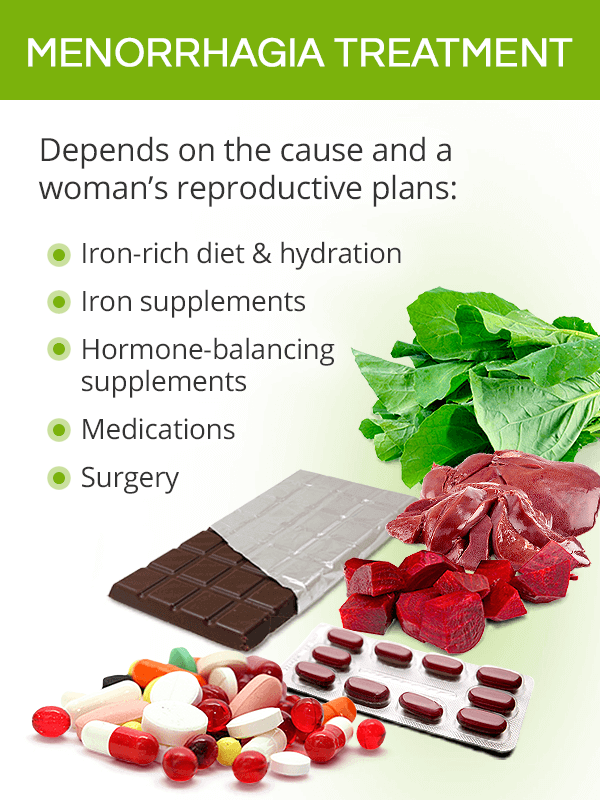
Heavy period treatment options depend on two factors: what is the underlying cause and whether a woman is planning to have children.
Diet
While a nutritious diet might not be enough to resolve heavy periods on its own, it can surely strengthen a woman's body and prevent the negative consequences of increased blood loss while she is receiving proper treatment. This includes loading up on iron-rich foods, like nuts, green vegetables, seeds, eggs, and meat, and keeping up with proper hydration.4
Supplements
To treat existing anemia or prevent its development, women with menorrhagia might be recommended an iron supplement. Moreover, they might consider one of two herbal supplements to promote hormonal balance and menstrual health.
They include phytoestrogenic supplements, like chaste tree, which contain plant estrogenic compounds that can be used short-term to fill in the hormonal gap and regulate periods, as well as hormone-balancing supplements, like Macafem, which safely nurture the endocrine glands into long-lasting menstrual equilibrium.
Medications
A woman with heavy periods might consider medications to reduce blood loss, like tranexamic acid; to relieve pain, like nonsteroidal anti-inflammatory drugs (NSAIDs), such as ibuprofen or naproxen (also to reduce the flow); or to balance hormones, which include oral contraceptives, progesterone pills, or intrauterine device (IUD).
However, it is important to remember that many medications only treat the symptoms, not the root cause of heavy menstrual bleeding, and might produce adverse effects.
Surgery
Women whose heavy periods are due to fibroids or polyps might consider surgical procedures, like dilation and curettage (D&C), uterine artery embolization, and endometrial resection or ablation, to remove or shrink the growths, thus lightening monthly periods. Those who do not plan to have children may opt for uterus removal, or hysterectomy.
Key Takeaways
It is common for women not to search treatment for heavy periods and accept them as the norm. However, heavy menstrual bleeding – medically known as menorrhagia - is a menstrual disorder characterized as losing more than 80 mL of blood per period, soaking through more than one pad or tampon per hour, and having large clots, among others symptoms. While it is most commonly caused by uterine fibroids or polyp, heavy bleeding during periods can be due to hormonal imbalance or unresolved medical conditions. Because of an increased risk of anemia, severe cramps, and psychosocial effects, menorrhagia should be properly treated to restore regularity and overall well-being. Although some women see improvements with a healthy diet and herbal supplements, others have to resort to taking medications or undergoing surgery. With the right knowledge and prompt treatment, most can reach long-term menstrual health in no time!
Sources
- American Family Physician. (2007). Treatment of Menorrhagia. Retrieved December 19, 2019 from https://www.aafp.org/afp/2007/0615/p1813.html
- BMJ Clinical Evidence. (2012). Menorrhagia. Retrieved December 19, 2019 from https://www.ncbi.nlm.nih.gov/pmc/articles/PMC3285230/
- CDC. (2017). Heavy Menstrual Bleeding. Retrieved December 19, 2019 from https://www.cdc.gov/ncbddd/blooddisorders/women/menorrhagia.html
- ISRN Obstetrics and Gynecology. (2013). The Effects of Menorrhagia on Women's Quality of Life: A Case-Control Study. Retrieved December 19, 2019 from https://www.hindawi.com/journals/isrn/2013/918179/
- Mayo Clinic. (2017). Menorrhagia (heavy menstrual bleeding). Retrieved December 19, 2019 from https://www.mayoclinic.org/diseases-conditions/menorrhagia/symptoms-causes/syc-20352829
- Office on Women's Health. (2018). Period problems. Retrieved December 19, 2019 from https://www.womenshealth.gov/menstrual-cycle/period-problems
- Office on Women's Health. (2018). Bleeding disorders. Retrieved December 19, 2019 from https://www.womenshealth.gov/a-z-topics/bleeding-disorders
- Stat Pearls. (2019). Menorrhagia. Retrieved December 19, 2019 from https://www.ncbi.nlm.nih.gov/books/NBK536910/
Footnotes:
- InformedHealth.org. (2009). Heavy periods: Overview. Retrieved December 19, 2019 from https://www.ncbi.nlm.nih.gov/books/NBK279294/
- Clinical Evidence. (2012). Menorrhagia. Retrieved December 19, 2019 from https://www.ncbi.nlm.nih.gov/pmc/articles/PMC3285230/
- American College of Obstetricians and Gynecologist. (2016). Heavy Menstrual Bleeding. Retrieved December 19, 2019 from https://www.acog.org/Patients/FAQs/Heavy-Menstrual-Bleeding
- Health Direct. (2019). Foods high in iron. Retrieved December 19, 2019 from https://www.healthdirect.gov.au/foods-high-in-iron
